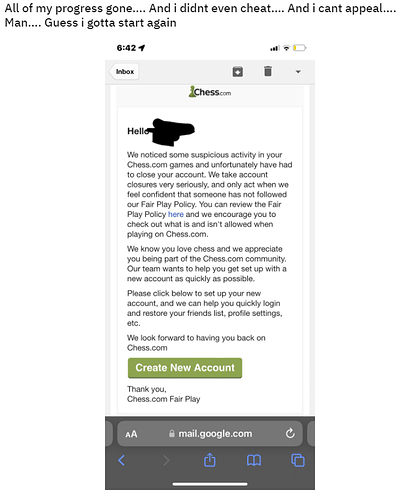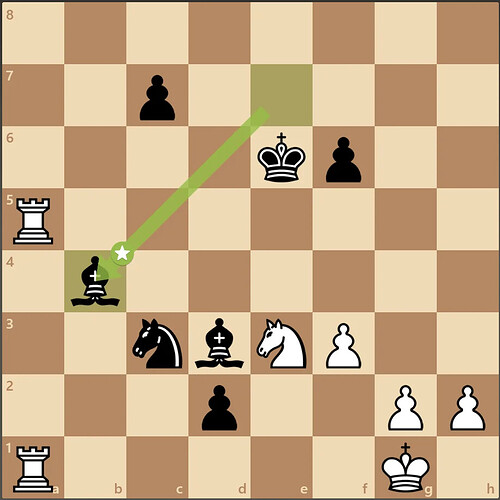It probably that everyone starts out there no matter how much chess in real life they have played. I’ve played like 5 live games lifetime so am an actual total noob. Some surely are not.
from what i remember everyone starts out at 800 on chess.com. after about 10-15 games you will reach a rating that pretty accurately depicts your skill level, and then you should win close to 50% of games from that point.
I started at 250
ok it may be different now. starting point is really only relevant for the first handful of games, you will eventually converge to your true rating no matter what point you start at.
Stalemate is a little silly and chess would probably be better off without it, but it’s a non-issue once you learn to look out for it.
There are probably clusters of cheating around the different Elo points you can start at now (because obvious cheaters get banned very quickly). The signs of a cheater are very high accuracy in game review (usually >= 95%) and taking 5-10 seconds per move regardless of whether the move is trivial or incredibly complicated. Chess.com is under quite a bit of stress at the moment because they are facing unprecedented numbers of new signups, so I assume the cheat detection team is flat out. I would guess it’s more likely what you said though, people who are not total noobs signing up at total-noob ratings. You could try out Lichess as well, I kind of prefer it. Everything is free, including unlimited game analysis. But it just flags moves as mistakes, it doesn’t tell you why like the chesscom Game Review thing does, it’s not that hard to learn to manually figure out why moves are mistakes using an engine though.
Chess can be overwhelming for new players, I recommend the YouTube Building Habits series (either the edited versions or full versions) by Grandmaster Aman Hambleton. The idea is that he plays games at low ratings (starting off at 400 I think) according to very simple rules and over time adds new rules in. It will help provide a bit of structure to what you’re doing when you’re very new, rather than making random moves. He’s a likeable guy and it’s entertaining (and he’s Canadian!). I also post a bit on the chessbeginners subreddit if you want to check that out, there’s a Wiki that has a bit more in the way of learning resources and you can ask questions, ask for game reviews, and so on.
Speaking of cheating, there was a pretty great cheater thread on r/chessbeginners the other day where a guy made this post:
I dug into some of his games and uncovered a very amusing game where he was losing and you could see in the game record he paused for like 2 mins to set the position up in an engine, then proceeded to play like 15 computer moves in a row, in cheater tempo (7-13ish seconds per move). One of the moves he played, in 8 seconds, was in this position:
Feel free to see if you too can find top engine move in 8 seconds here! Answer below.
The move is R5a3. Yep.
Very weird psychology to me to post on a forum full of people who are better at chess than you and are going to scour your games when you did in fact cheat. But I’m sure he had some rationalization, he wasn’t cheating every game. Like oh I only do it when I make a bad mistake, just to get back in the game, that’s not REALLY cheating right? Something like that.
New accounts start at a low elo but their playing ability might represent a higher rating. So it could take some games for them to get an accurate rating. I’m experiencing that now (low elo but plays higher).
Also, run the game through stockfish to see how an AI would assess their play. Some moves are very stereotypical of AI play. Another possibility could be to post your game here to see what we think.
Anyway, the analysis tools on chess.com are actually pretty solid. I find them pretty interesting to use and think that the premium account is worthwhile if you want to improve at the game.
But ultimately the best way to improve is OTB play. But because of the convenience of chess online, it’s becoming harder to find OTB games.
I think online play is just as good as OTB to improve personally. More so if you take into account the convenience.
I think the biggest advantage of OTB play for newer players is that developing players should play slower games so they have time to think through what they’re doing and develop calculation skills. I never play OTB, but I’ve joined an online club that really promotes classical games so I play one long game per week with someone in the club. Before I started playing these 60|30 games I basically couldn’t calculate at all because I was only playing games that are like 10 minutes long. In my classical games I will sometimes spend 10 minutes calculating variations in one critical position. My play has improved a lot.
Aman’s series is very good at building up the fundamentals. And new players should drill tactics daily. Do puzzle rush every day and your rating will climb pretty fast.
Definitely true that most newer players play on time controls that are too fast and struggle to improve as a direct result.
No I don’t think so. Online gives you access to many more players playing a wider range of openings from which you’ll learn faster, and more people playing faster time limits.
In a game of (mainly) pattern recognition you want to get as many games in as possible at the faster time limits you can still play near your best imo, and let your brain soak up the positions. If you find you’re not seeing/understanding much more at 30mins than at 15, then play 15 and twice the number of games.
I play real life with a buddy but am trying to get better online because he is way better than me. Not as fun when it’s a bloodbath every game.
Some of the free training sites mentioned by people here would be good.
I think I may be fucking this up too. I’m playing 10 min game and lose to time a bunch. Maybe I need to stop this.
I would at least move to 15m with a 10sec increment so you have time to think, and if you burn your clock thinking then you can at least bang out moves indefinitely in the 10sec increment.
Good idea. I get so tilted when I lose to time.
Lol
Those are fair points but I really don’t communicate or receive any feedback from my opponents at pivotal points where I can make my game better. For me, I find that I focus better OTB than playing online which means that I make way fewer mistakes. Plus, you can’t misclick OTB.
Chess OTB also feels like a more honest and personable environment where people aren’t looking at Stockfish to find the optimal play against their faceless opponents.
I can’t imagine that cheating is that rampant at the lower levels. I win about half my games, suggesting that the chesscom match ups are fair. If even 10% of my opponents were cheating I would be performing noticeably under 50% even against my “equal” opponents.
The more I think about I think it’s that everyone starts at 250 no matter how much experience they have OTB or on other sites. When I feel like they are cheating because they seem so good, they may in fact just be so good and not yet sorted by the rankings.
Also, I suck!

